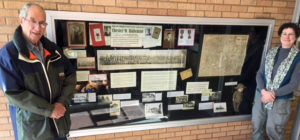 I just changed my foyer display to feature Chester W. Bidleman who served in the trenches in France. Chester’s granddaughter, Lucinda, recently came to visit her father, Bill John. She generously brought in and shared Chester’s memorabilia with us to scan for this display and to archive in our collection.
I just changed my foyer display to feature Chester W. Bidleman who served in the trenches in France. Chester’s granddaughter, Lucinda, recently came to visit her father, Bill John. She generously brought in and shared Chester’s memorabilia with us to scan for this display and to archive in our collection.
Chester wrote letters and kept a small diary during his months of service. The diary is in such good shape, I can only imagine that he carried it in a small tin box or leather case for protection during those hard days. I will be excerpting Chester’s diary and letters in future posts during the next few months as we follow his war experiences. But first, a little bit about Chester.
Chester was born January 18, 1895 in Seward, KS to William and Etta Bell Bidleman. The family came to Edwards County by 1908. Chester graduated from Kinsley High School in 1913. He went on to Kansas State Normal College (Emporia) for two years and became a teacher of mathematics in Greeley, Kansas.
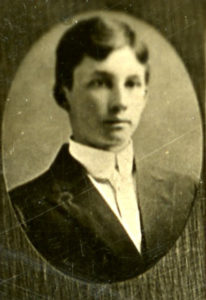
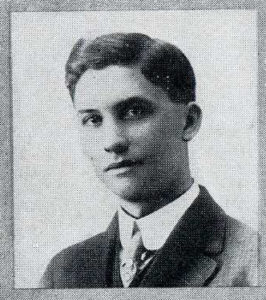
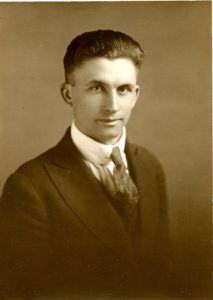 1913 H.S. Graduation 1915 College Graduation 1916 – Teaching
1913 H.S. Graduation 1915 College Graduation 1916 – Teaching
(Below) Chester and Cyrus C. Barnes, 1917
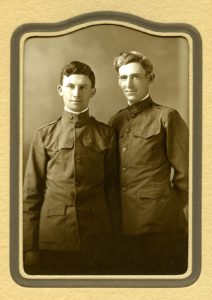 According to Chester’s diary, on April 24, 1917 in Burlington, Kansas, he “put down his John Henry to join the army.” He took his physical the next day and was accepted for enlistment into Company C, First Kansas Infantry.
According to Chester’s diary, on April 24, 1917 in Burlington, Kansas, he “put down his John Henry to join the army.” He took his physical the next day and was accepted for enlistment into Company C, First Kansas Infantry.
He wrote on his Service Record forms that he reported “at a rendezvous” on August 5, 1917. The U.S. Army made getting typhoid shots mandatory for all its enlisted soldiers, and Chester started his series on August 5. He signed a muster roll for the first time on August 31 and received his first month’s pay on September 30. (It is uncertain, but he may have been at Camp Funston during this time.
He left Burlington for Camp Doniphan, Oklahoma on September 30 for six months of training. The following excerpt is from a letter which was published in the Kinsley Graphic on February 21, 1918 and appears to be an answer to a letter from his mother.
“Dear mama:
This is the nicest day we have had here for a long while, and can hardly stay inside, as I suppose tomorrow the dirt will be flying again. We did not drill two afternoons the last week, as the dust was blowing so much that we couldn’t see where we were going. The dirt is almost as bad inside the tents as outside.
Hope we leave before March 1st, if it is any worse then than now. I do not have any ideas as to when we will leave. No. the report that we are to stay here sixteen more weeks is not an order – just some more Great Bend Tribune dope, is all. We will likely leave sometime in March. We were to have left before now, but the 32nd division was better trained and took our place. If we had gone, part of us would have been on the Tuscania. Guess there is some advantage in being poor soldiers….”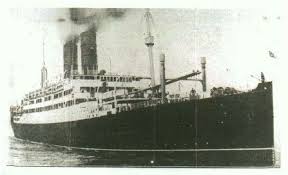
Chester is referring to the February 5, 1918, sinking of the Tuscania. This luxury liner was turned into an American troop ship and was en route to Britain with more than 2,013 American soldiers and a crew of 384 on board. It was torpedoed by the German submarine UB-77 in the North Channel and sank. 210 lives were lost, either by drowning in the seas or being dashed to death on the rocks. The Tuscania was the first ship carrying American troops to be sunk in the war, and the American public was outraged by its loss.
Look for more reprinted from Chester’s letter in my next post.
